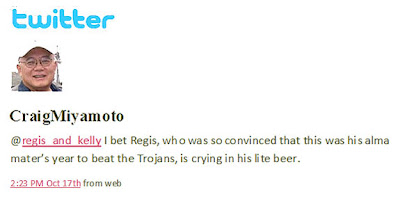
It brought a lump in my throat, a fullness in my heart, and tears to my eyes.
I didn’t know 20-year-old Jasper Howard, and I haven’t been following the University of Connecticut’s football team. All I had was a vague recollection of a story a week ago, about a college football player who’d been stabbed to death after a school rally.
But I have a greater understanding today of how much he meant to his team, and to college football everywhere. “Jazz,” as he was affectionately known, grew up and played high school ball in Miami.
Hundreds of miles south of West Virginia, where the UConn Huskies were playing, members of the University of Miami team paid tribute him in their own small way, including wearing his number on their eye-blacks. Many had known him and played alongside or against him in high school.
Still, the greatest tribute to the fallen collegian came during UConn’s game at Morgantown, where the Huskies were being hosted by the Mountaineers. When UConn emerged from the tunnel, the West Virginia fans in the stadium and the Mountaineers football team stood as one and applauded Jazz’s teammates as they marched hand-in-hand onto the field, carrying Number 6’s helmet and jersey.
It was a simple gesture, yet it was as heart-rendering and supportive as any other that could have been offered. The ovation was for Jazz and for the UConn team, which had decided to play on in dedication to the memory of a fallen teammate.
The ovation delivered a greater message however; the ovation was also for college football – a demonstration that beyond school spirit and pride, beyond team play, beyond the polls, beyond talented collegians rising to challenges, there is in college football a link between all of its coaches, players, fans, and schools.
It rises far above the scores, the rankings and the bowl games. It calls us together every fall to become one nation again, perhaps with divisions among us, but certainly to bind us together as a fraternity of brothers and sisters.
The ovation – it was a touching act of class.


 Not good for tourism, but what can anyone do about it? Nothing.
Not good for tourism, but what can anyone do about it? Nothing.













 Budaors, by the way, is in the Budapest metropolitan area, in (get this) … Pest County. It started as a settlement in 3500 BC and has a population of 26,400 people.
Budaors, by the way, is in the Budapest metropolitan area, in (get this) … Pest County. It started as a settlement in 3500 BC and has a population of 26,400 people.





 Parasailing is a popular offshore activity. We see at least one in the air every time we go to Waterfront Park. I personally would never do that 'cause a tourist once fell and died when she went splat against the ocean surface.
Parasailing is a popular offshore activity. We see at least one in the air every time we go to Waterfront Park. I personally would never do that 'cause a tourist once fell and died when she went splat against the ocean surface. I’m not a mycologist by any stretch of the imagination, so my Google search might not be accurate. But this is either an edible Almond Mushroom (Agaricus subrufescens), or a deadly Amanita mormorata. That's 50-50 … not so good odds.
I’m not a mycologist by any stretch of the imagination, so my Google search might not be accurate. But this is either an edible Almond Mushroom (Agaricus subrufescens), or a deadly Amanita mormorata. That's 50-50 … not so good odds.


 Great Variety of Beautiful Flowers
Great Variety of Beautiful Flowers











 But the back of the ticket carries more meaning. Just as you are given an identity when you tour the National Holocaust Museum in Washington DC, just as you are given an identity when you visit the Titanic exhibition traveling the country, so do you become someone who was actually there on that fateful “Day of Infamy.”
But the back of the ticket carries more meaning. Just as you are given an identity when you tour the National Holocaust Museum in Washington DC, just as you are given an identity when you visit the Titanic exhibition traveling the country, so do you become someone who was actually there on that fateful “Day of Infamy.”